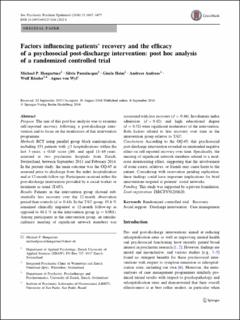Bitte benutzen Sie diese Kennung, um auf die Ressource zu verweisen:
https://doi.org/10.21256/zhaw-3990| Publikationstyp: | Beitrag in wissenschaftlicher Zeitschrift |
| Art der Begutachtung: | Peer review (Publikation) |
| Titel: | Factors influencing patients’ recovery and the efficacy of a psychosocial post-discharge intervention : post hoc analysis of a randomized controlled trial |
| Autor/-in: | Hengartner, Michael Pascal Passalacqua, Silvia Heim, Gisela Andreae, Andreas Rössler, Wulf von Wyl, Agnes |
| DOI: | 10.21256/zhaw-3990 10.1007/s00127-016-1282-8 |
| Erschienen in: | Social Psychiatry and Psychiatric Epidemiology |
| Band(Heft): | 51 |
| Heft: | 12 |
| Seite(n): | 1667 |
| Seiten bis: | 1677 |
| Erscheinungsdatum: | Dez-2016 |
| Verlag / Hrsg. Institution: | Springer |
| ISSN: | 0933-7954 1433-9285 |
| Sprache: | Englisch |
| Fachgebiet (DDC): | 362: Gesundheits- und Sozialdienste 616.89: Psychische Störungen, klinische Psychologie und Psychiatrie |
| Zusammenfassung: | Purpose: The aim of this post hoc analysis was to examine self-reported recovery following a post-discharge intervention and to focus on the moderators of this intervention programme. Methods: RCT using parallel group block randomisation, including 151 patients with ≤3 hospitalisations within the last 3 years, a GAF score ≤60, and aged 18–64 years, assessed at two psychiatric hospitals from Zurich, Switzerland, between September 2011 and February 2014. In the present study, the main outcome was the OQ-45 as assessed prior to discharge from the index hospitalisation and at 12-month follow-up. Participants received either the post-discharge intervention provided by a social worker or treatment as usual (TAU). Results: Patients in the intervention group showed substantially less recovery over the 12-month observation period than controls (d = 0.44). In the TAU group, 15.6 % remained clinically impaired at 12-month follow-up as opposed to 48.1 % in the intervention group (p = 0.001). Among participants in the intervention group, an interdisciplinary meeting of significant network members was associated with less recovery (d = 0.46). Involuntary index admission (d = 0.42) and high educational degree (d = 0.52) were significant moderators of the intervention. Both factors related to less recovery over time in the intervention group relative to TAU. Conclusions: According to the OQ-45, this psychosocial post-discharge intervention revealed an unintended negative effect on self-reported recovery over time. Specifically, the meeting of significant network members related to a moderate deteriorating effect, suggesting that the involvement of some carers, relatives, or friends may cause harm to the patient. Considering with reservation pending replication, these findings could have important implications for brief interventions targeted at patients’ social networks. |
| Weitere Angaben: | Erworben im Rahmen der Schweizer Nationallizenzen (http://www.nationallizenzen.ch) |
| URI: | https://digitalcollection.zhaw.ch/handle/11475/2258 |
| Volltext Version: | Publizierte Version |
| Lizenz (gemäss Verlagsvertrag): | Lizenz gemäss Verlagsvertrag |
| Gesperrt bis: | 2021-12-01 |
| Departement: | Angewandte Psychologie |
| Organisationseinheit: | Psychologisches Institut (PI) |
| Publiziert im Rahmen des ZHAW-Projekts: | Poststationäre Netzwerkkoordination (ZInEP) |
| Enthalten in den Sammlungen: | Publikationen Angewandte Psychologie |
Dateien zu dieser Ressource:
| Datei | Beschreibung | Größe | Format | |
|---|---|---|---|---|
| Hengartner2016_Article_FactorsInfluencingPatientsReco.pdf | 572.74 kB | Adobe PDF |  Öffnen/Anzeigen |
Zur Langanzeige
Hengartner, M. P., Passalacqua, S., Heim, G., Andreae, A., Rössler, W., & von Wyl, A. (2016). Factors influencing patients’ recovery and the efficacy of a psychosocial post-discharge intervention : post hoc analysis of a randomized controlled trial. Social Psychiatry and Psychiatric Epidemiology, 51(12), 1667–1677. https://doi.org/10.21256/zhaw-3990
Hengartner, M.P. et al. (2016) ‘Factors influencing patients’ recovery and the efficacy of a psychosocial post-discharge intervention : post hoc analysis of a randomized controlled trial’, Social Psychiatry and Psychiatric Epidemiology, 51(12), pp. 1667–1677. Available at: https://doi.org/10.21256/zhaw-3990.
M. P. Hengartner, S. Passalacqua, G. Heim, A. Andreae, W. Rössler, and A. von Wyl, “Factors influencing patients’ recovery and the efficacy of a psychosocial post-discharge intervention : post hoc analysis of a randomized controlled trial,” Social Psychiatry and Psychiatric Epidemiology, vol. 51, no. 12, pp. 1667–1677, Dec. 2016, doi: 10.21256/zhaw-3990.
HENGARTNER, Michael Pascal, Silvia PASSALACQUA, Gisela HEIM, Andreas ANDREAE, Wulf RÖSSLER und Agnes VON WYL, 2016. Factors influencing patients’ recovery and the efficacy of a psychosocial post-discharge intervention : post hoc analysis of a randomized controlled trial. Social Psychiatry and Psychiatric Epidemiology. Dezember 2016. Bd. 51, Nr. 12, S. 1667–1677. DOI 10.21256/zhaw-3990
Hengartner, Michael Pascal, Silvia Passalacqua, Gisela Heim, Andreas Andreae, Wulf Rössler, and Agnes von Wyl. 2016. “Factors Influencing Patients’ Recovery and the Efficacy of a Psychosocial Post-Discharge Intervention : Post Hoc Analysis of a Randomized Controlled Trial.” Social Psychiatry and Psychiatric Epidemiology 51 (12): 1667–77. https://doi.org/10.21256/zhaw-3990.
Hengartner, Michael Pascal, et al. “Factors Influencing Patients’ Recovery and the Efficacy of a Psychosocial Post-Discharge Intervention : Post Hoc Analysis of a Randomized Controlled Trial.” Social Psychiatry and Psychiatric Epidemiology, vol. 51, no. 12, Dec. 2016, pp. 1667–77, https://doi.org/10.21256/zhaw-3990.
Alle Ressourcen in diesem Repository sind urheberrechtlich geschützt, soweit nicht anderweitig angezeigt.